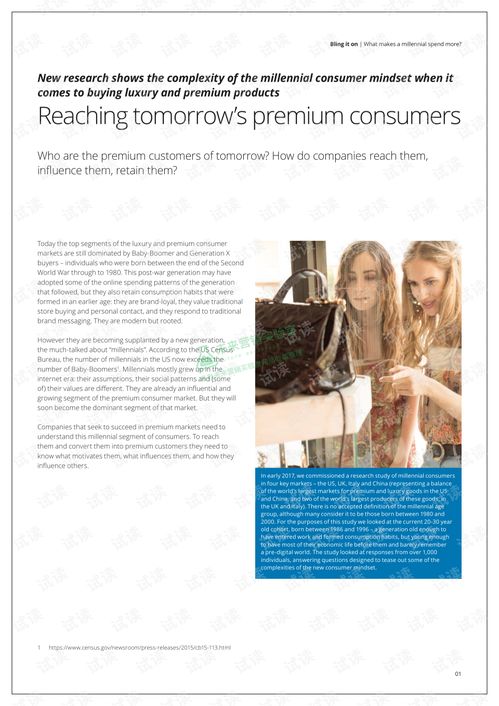奢侈品有没有必要买英语作文
Title: Is It Still Worth Buying Luxury Goods?
In today's rapidly changing world, the question of whether to invest in luxury goods remains pertinent. Let's delve into this topic from various angles to provide a comprehensive answer.

Economic Perspective:
From an economic standpoint, purchasing luxury goods can be seen as a discretionary expense. During periods of economic uncertainty, such as recessions or market downturns, consumers may opt to tighten their belts and prioritize essential spending over luxury items. However, economic conditions fluctuate, and there are times when investing in luxury goods can be considered a sound decision, especially during economic upturns when consumer confidence and disposable income are high.
Personal Fulfillment:
Luxury goods often carry symbolic value beyond their functional purpose. For many individuals, owning luxury items represents a milestone of success, accomplishment, or selfreward. The decision to buy luxury goods is deeply personal and may contribute to one's sense of identity, confidence, and satisfaction. However, it's essential to differentiate between genuine personal fulfillment and the pursuit of materialistic validation.
Quality and Craftsmanship:
One of the hallmarks of luxury goods is the emphasis on quality and craftsmanship. Luxury brands often invest significant resources in sourcing the finest materials and employing skilled artisans to create products of unparalleled excellence. Consequently, purchasing luxury goods can be justified by the superior quality, durability, and timeless appeal they offer. This aspect is particularly relevant for items like watches, handbags, and jewelry, which can retain or even appreciate in value over time.
Status and Prestige:
In certain social circles, owning luxury goods serves as a status symbol and signifies belonging to an exclusive group of individuals. The prestige associated with luxury brands can confer social recognition, elevate one's perceived status, and open doors to networking opportunities or exclusive events. However, it's crucial to assess whether the desire for statusdriven consumption aligns with personal values and longterm goals.
Sustainability and Ethical Considerations:
In recent years, there has been a growing awareness of sustainability and ethical practices within the luxury industry. Consumers are increasingly scrutinizing brands' commitments to environmental conservation, fair labor practices, and ethical sourcing of materials. When contemplating luxury purchases, individuals may weigh these factors and support brands that demonstrate a genuine commitment to sustainability and corporate social responsibility.
Investment Potential:
While luxury goods are primarily purchased for personal enjoyment, certain items have demonstrated investment potential. Limited edition pieces, rare collectibles, or iconic designs from renowned brands can appreciate in value over time, making them attractive assets for collectors and investors. However, investing in luxury goods requires thorough research, market knowledge, and a longterm perspective, as trends and demand patterns can fluctuate.
Conclusion:
In conclusion, the decision to buy luxury goods depends on various factors, including economic conditions, personal preferences, values, and longterm goals. While luxury purchases can provide aesthetic pleasure, personal fulfillment, and even investment opportunities, it's essential to approach them thoughtfully and responsibly. Whether one chooses to indulge in luxury or prioritize other forms of expenditure, the key lies in aligning consumption habits with one's values, aspirations, and financial circumstances.
1.本站遵循行业规范,任何转载的稿件都会明确标注作者和来源;2.本站的原创文章,请转载时务必注明文章作者和来源,不尊重原创的行为我们将追究责任;3.作者投稿可能会经我们编辑修改或补充。








